Archive
17 October 2024
TU Delft Research Reactor ready for faster research

Over the past few years, a team of scientists and technicians from the TU Delft Reactor Institute have been working on a large-scale upgrade and modernisation of the Delft reactor. The result is a state-of-the-art facility where researchers and students from around the world can now conduct faster and more advanced research. The milestone was officially celebrated on Thursday 17 October 2024.
17 October 2024
TU Delft researchers provide part of the puzzle to produce alternatives for fossil fuels
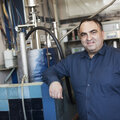
In the quest to develop synthetic oils and fuels, TU Delft has successfully produced an in-situ cell that aids in understanding the process of catalysts. This achievement is part of research conducted in collaboration with Eindhoven University and the National Institute of Clean and Low-Carbon Energy.
11 October 2024
Delft scientists discover how innate immunity envelops bacteria
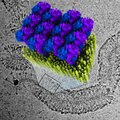
The protein GBP1 is a vital component of our body’s natural defence against pathogens. This substance fights against bacteria and parasites by enveloping them in a protein coat, but how the substance manages to do this has remained unknown until now. Researchers from Delft University of Technology have now unravelled how this protein operates. This new knowledge, published in Nature Structural & Molecular Biology, could aid in the development of medications and therapies for individuals with weakened immune systems.
10 October 2024
Natalia Vtyurina winner Marina van Damme Grant 2024

On Thursday 10 October, Delft University Fund organised the 2024 Marina van Damme Grant Award Ceremony. Three female Delft alumni stood the chance to win the coveted grant of € 9,000,-. After three impressive pitches and a short jury meeting, Prof. Marina van Geenhuizen, chair of the jury, announced that it was Natalia Vtyurina for winning the 2024 Marina van Damme Award!
27 September 2024
First-ever imaging of pathogens on lettuce leaves in real-time

Met een groeiende wereldbevolking van meer dan 8 miljard mensen is voldoende voedsel produceren een uitdaging. Nederland is ‘s werelds tweede exporteur van voedsel en verbouwt enorm efficiënt allerlei gewassen. Plantenziektes zoals valse meeldauw zijn echter een veelvoorkomend probleem dat de oogst van de boer flink kan bederven. Delftse wetenschappers hebben voor het eerst een manier ontwikkeld om de infectie in planten real-time te volgen, zonder de plant te hoeven doden. De hiermee opgedane kennis helpt om nieuwe resistente gewassen te kweken met een hogere opbrengst en minder gebruik van pesticiden. Het onderzoek staat nu in Nature Communications.
25 September 2024
Do something that matters

We komen in Nederland in het basis- en voorgezet onderwijs samen 13.500 leraren tekort. Het leraarschap heeft niet altijd de reputatie die het verdient. En dat terwijl het alles in zich heeft. Daarom startte Universiteiten van Nederland (UNL) vorig week de campagne ‘Doe iets wat ertoe doet’. Het doel is om mensen met een nieuwe blik naar het leraarschap te laten kijken.
18 September 2024
Stefan Witte joins Imaging Physics as professor
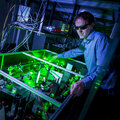
Delft University of Technology's Executive Board has appointed Stefan Witte as professor of Optics for nanoscale metrology in the Imaging Physics department of the Faculty of Applied Sciences as of September 2024. Thanks to the TU Delft Excellence Fund, Stefan Witte can get off to a flying start with his new research group and expects to obtain the first research results soon.
12 September 2024
Quantum researchers cause controlled ‘wobble’ in the nucleus of a single atom
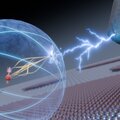
Researchers from Delft University of Technology in The Netherlands have been able to initiate a controlled movement in the very heart of an atom. They caused the atomic nucleus to interact with one of the electrons in the outermost shells of the atom. This electron could be manipulated and read out through the needle of a scanning tunneling microscope. The research, published in Nature Communications today, offers prospects for storing quantum information inside the nucleus, where it is safe from external disturbances.
11 September 2024
TU Delft Pre-University Team Wins SEFI Francesco Maffioli Award
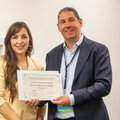
04 September 2024
ERC Starting Grant for shedding light on neurodegenerative disease

Neurodegenerative diseases such as Huntington’s disease are incurable. These diseases are progressive brain disorders with severe effects on movement and mental functioning. How damage in the brain develops is far from understood however. Biophysicist Kristin Grußmayer has been awarded an ERC Starting Grant that enables her to search for causes by looking into brain cells and individual molecules.